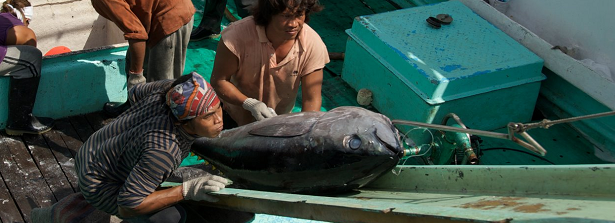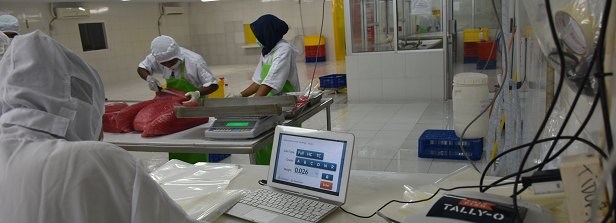Technology innovations towards sustainability in tuna supply chains Indonesia

Duration: April 2015 – October 2016. This project has been finalized.
Project information
Aim: To develop a traceability-based technology (TBT) platform that creates information exchange between Indonesian fishermen, processors and traders. Fishermen will be facilitated in linking with fisheries and global markets, while processors and traders will be assisted in meeting requirements from importing regions.
Objective: To enhance already existent systems and make them more efficient and useable for Indonesian supply chain actors to participate in quickly evolving international markets. To better equip tuna fisheries in supporting livelihoods, appetites and businesses and ultimately to improve the sustainability of tuna stocks and the livelihoods of fishing communities.
Method: Implement traceability-based technologies (TBT) for fishermen, processors and traders in selected Indonesian tuna value chains. Extensive relationships with fishermen and processors in several sites in Indonesia have been established, and the process of educating value chain actors on the importance of information for regulation and for market access has begun. Interviews and surveys will be conducted to assess the informational needs; technology hardware will be introduced into processing plants and at fisheries landing sites; finally the TBT will be adapted and modified based on evaluation results.
Country: Indonesia.
Dutch policy goals: Increased sustainable agricultural production; Improved access to better nutrition; More efficient markets; and A better business climate.
Progress reports
Year 1: High domestic and export demand for tuna coupled with informational uncertainties in Indonesian tuna fisheries threatens the sustainability of tuna stocks and the livelihoods of fishing communities. The ability of these tuna fisheries to support livelihoods, appetites and businesses relies on information to be provided and communicated by fishermen and processors. This project assesses the informational needs of Indonesian fishers and processors, and develops and implements traceability based technology (TBT) in Indonesian tuna value chains in order to create a bidirectional information exchange between Indonesian fishermen and processors. The associated research assesses the success of TBTs in linking fisheries information and global markets, and helping processors to meet informational requirements originating from importing countries such as Europe and the United States.
Final report
Summary of the results: This project implemented a technology platform on top of an existing paper-based traceability system in select tuna fisheries in Indonesia. Following a needs assessment, fishers expressed a desire for technology that helped them predict issues at sea and protect them (for example apps for due weather and emergency signa Is), while processors expressed a desire for greater automation of existing logistics practices. Based on the needs assessment a set of coordinated technological interventions were implemented. Following implementation the consequences of these interventions were evaluated. In practice the introduction of these technologies has led to the creation of digital records of key information needed for traceability, albeit not coordinated throughout the chain. From a research perspective new insights were gained on both practical and social challenges of these technology interventions. Due to the action research approach of this project lessons learnt were incorporated into a staggered approach of implementation of these technologies. Barriers were confronted along the way and these have been communicated to policy makers and technology providers at various conferences, in hopes of resulting lessons learned leading to more streamlined implementation in future sites.

